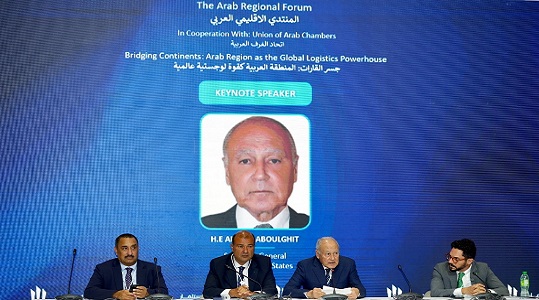Secretary-General of the Union of Arab Chambers, Dr. Khaled Hanafi, emphasized during the session he moderated, titled “Bridging Continents: The Arab Region as a Global Logistics Power,” within the Arab Regional Forum held as part of the activities of the Annual Investment Meeting (AIM Congress 2025) in the UAE capital, Abu Dhabi, the event was attended by heads of state, prime ministers, ministers, and the Secretary-General of the League of Arab States, Ahmed Aboul Gheit, as well as a large crowd of Arab and foreign private sector leaders, senior officials and directors of international organizations, and a group of decision-makers, investors, experts, and academics from around the world, "The Arab region is witnessing a dynamic economic transformation, with logistics becoming one of the most important pillars for achieving sustainable development," he explained, adding that "according to the World Bank's 2023 report, the Arab region represents 10 percent of global trade, thanks to its strategic geographic location. In addition, World Trade Organization estimates indicate that the volume of intra-Arab trade has increased by 15 percent over the past five years, reflecting significant growth in regional economic cooperation."
The Union’s Secretary-General expects the e-commerce market in the Middle East and North Africa region to grow by 20 percent annually over the next five years, which will increase demand for advanced logistics services. He noted that the challenges carry within them promising investment opportunities for investors seeking to benefit from the expected growth in the logistics sector in the region, especially with the major projects being implemented, including, for example, the expansion of the historic Suez Canal. In addition to developing the surrounding economic zone, the canal's capacity increased by 50 percent, allowing 97 ships to pass daily, compared to 49 ships before the expansion. In addition, the Suez Canal Economic Zone has attracted investments amounting to $15 billion in sectors such as energy, industry, and logistics, while the project has contributed to increasing Suez Canal revenues to $7 billion annually, according to 2023 statistics.
He noted that "the Port of Tangier Med is considered one of the largest ports in Africa and the Mediterranean region. The port is located on the Strait of Gibraltar, which gives it a strategic location to connect Europe with Africa and the world. It also contributes 7 percent of Morocco's GDP. Meanwhile, the Aqaba Logistics Center, which aims to transform the city of Aqaba into a regional logistics hub, thanks to its strategic location on the Red Sea, has a capacity of 1.5 million containers annually. The project has also contributed to a 20 percent increase in Jordan's foreign trade volume since its inception. Meanwhile, the Iraqi railway project aims to connect Iraqi ports with Turkey, Iran, and neighboring countries. 2,000 kilometers of railway lines have been developed, reducing the time it takes to transport goods between Iraqi cities. Transportation costs have also been reduced by 20 percent, and the project has contributed to a 10 percent increase in Iraq's foreign trade volume.”
The Secretary-General of the Union stated that “Arab countries will not be able to achieve a global logistical position without adopting modern technology. According to a McKinsey report, investing in digital technology can increase supply chain efficiency by up to 40 percent. In this regard, the UAE is leading regional efforts through projects such as port digitization, where artificial intelligence technologies were implemented at Dubai Ports, reducing ship unloading time by 20 percent. While the GCC Railway will provide a rapid land transport network linking the Gulf countries, which will reduce transportation costs by 30 percent, according to estimates by the Gulf Transport Authority.”
Dr. Khaled Hanafi stated, "The Arab region has all the ingredients to become a global logistics powerhouse, as it boasts a strategic location, a growing infrastructure, and a strong political will. However, achieving this vision requires regional and international cooperation and investment in technology and innovation."
He stressed that “the Union of Arab Chambers is committed to leading these efforts and working with all partners to achieve this vision. By 2030, we aspire for the Arab region to become one of the world's most important logistics centers. To achieve this vision, we need to increase investment in infrastructure. The World Bank estimates that the region needs investments of up to $1 trillion in infrastructure by 2030. We also need to enhance regional cooperation through initiatives such as the Greater Arab Free Trade Area, which will contribute to increasing intra-regional trade by 50 percent by 2030.”
Source (Union of Arab Chambers)

